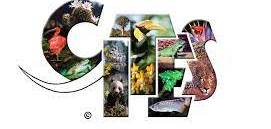
• Indonesia ranks 9th in a list of the 80 countries with the most specimens of wild animals legally exported abroad since 1975, new research shows.
• Legal international trade in wildlife is governed by CITES, whose trade database shows Indonesia exported 7.7 million live animals in the past 46 years, of which more than a quarter of arowana fish.
• Although these agreements are legal, experts say the government should try to minimize the practice and focus more on conserving wild populations of these species.
• Critics of legal wildlife trade have long accused the help hide the illegal trade, mainly in "washing" the animals caught in the wild through breeding in captivity.
A recent analysis of the legal wildlife trade over the past 46 years places Indonesia, a biodiversity hotspot in Southeast Asia, among the top 10 exporters of live animals.
Indeed, the study, published on November 11 by the Oslo-based website Outforia, analyzed data from CITES, the 1975-2021 global convention on international wildlife trade. It places Indonesia in 9th place on the list of 80 countries (El Salvador coming first), with 7.7 million live animal exports since 1975. The most traded animal in Indonesia, with more than 2 million live specimens, is the arowana fish from the Borneo and Sumatran rivers, which are highly valued in the fish trade in Southeast and East Asia. They were also the 8th most exported live animal in the past 46 years, according to the survey.
All of these transactions constitute legal affairs, regulated by Indonesian authorities and importing countries and recorded in the CITES trade database. The role of CITES is to tightly regulate legal trade in wildlife to ensure that it does not adversely affect wild populations of species in trade.
But even if these companies are legal and monitored, biodiversity-rich countries like Indonesia should try to minimize them and focus more on conserving the ecosystems in which these species are found, said Sunarto, associate researcher at the Institute of Sustainability of the University of Indonesia. Land and resources.
Profits from live animal exports should be allocated to strengthen surveillance, management and protection of wildlife and habitats, he added.
“If these (conservation) aspects are not respected, having a great export value is not something to be proud of,” he said in an interview with Mongabay. “Instead, it should be a concern that needs to be further explored so that changes and improvements can be made to policies and practices for managing wildlife in habitat and facilities. breeding in captivity, as well as in the commercial process. "
The persistence of illegal wildlife trade and its significant overlap with legal trade are considered by experts to be a major threat to the conservation of many species in Indonesia, inexorably leading some to extinction. Some of the major export markets include Europe, the United States, Hong Kong, Malaysia, and Singapore.
The Indonesian government has implemented some policies to better regulate the trade, including promoting the captive breeding of species that cannot normally be removed from the wild. However, conservationists say it offers traffickers the opportunity to "wash" illegally caught wild animals, passing them through captive breeding sites as if they were born there.
Industry observers point to significant disparities between the number of animals exported from Indonesia declared as captive breeders and the number of specimens that the country's breeding grounds produce or are capable of producing. These differences suggest that many exported live animals may be wild-caught specimens exported by a captive-breeding facility.
There is already evidence of wildlife washing for some species in Indonesia. A 2011 study suggested that nearly 80% of the 5,337 green pythons (Morelia viridis) exported from breeding sites between 2009 and 2011 were in fact captured from the wild in eastern Indonesia.
Sunarto said it was important to remember the central role of Indonesian wildlife, which is "to safeguard the health of the forests, which are our stronghold against the climate crisis".
About 200 million legal transactions of live animals worldwide have been recorded in the CITES trade database since 1975, with the peak occurring from 1999 to 2003, when around 7 million specimens have been marketed each year. The most important year for trade was 2018, when 10.8 million live animals were registered. Iguanas (family Iguanidae) are the most exported live animals in the world, with 34 million legally traded in the past 46 years. They are popular as exotic pets in many countries, although some are also acquired by zoos.
“Due to growing consumer demand for animal products in the form of clothing, food and accessories, nature's trade is large and profitable,” Outforia said in the study.
Posted on 2021-12-26 17:13








Comments